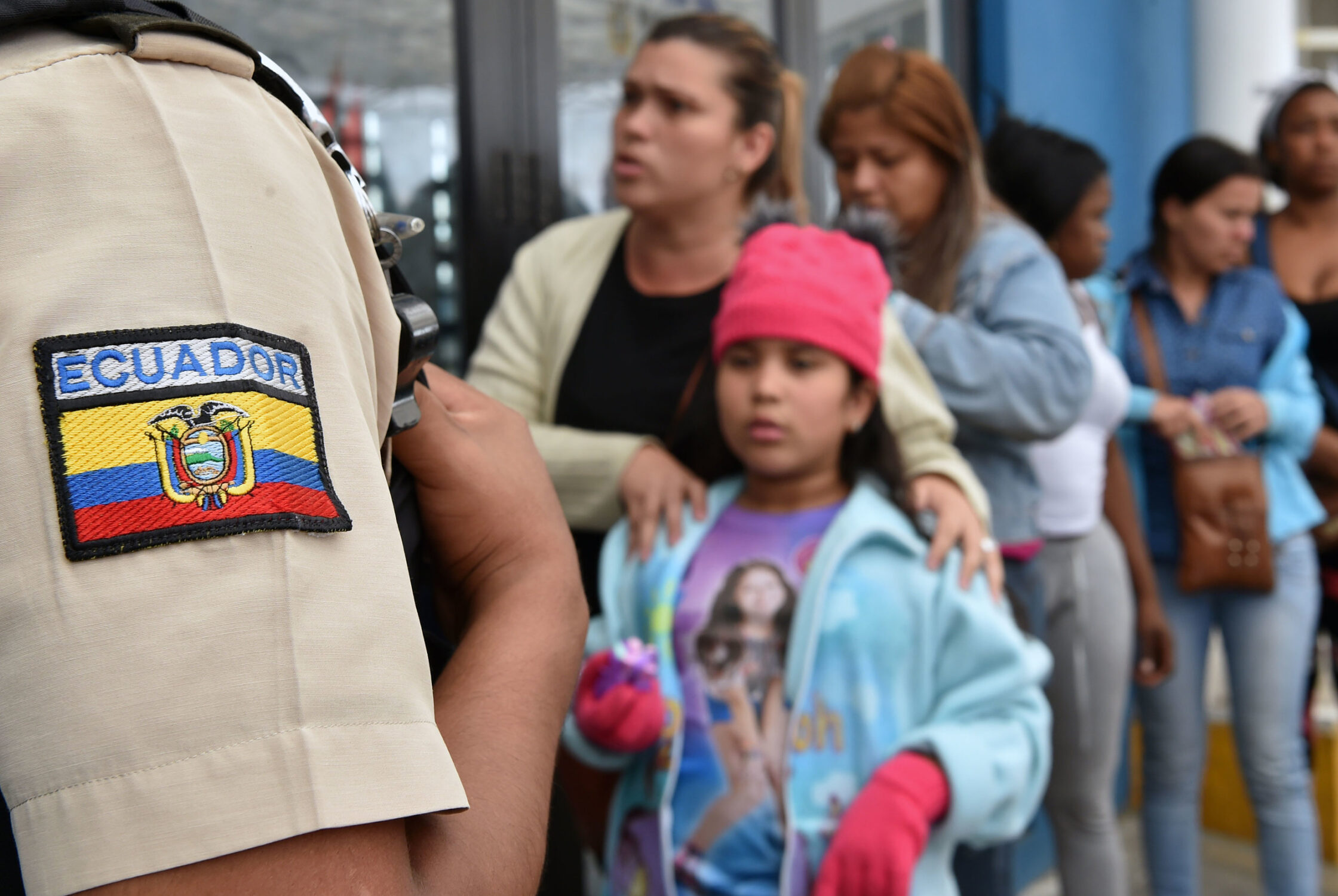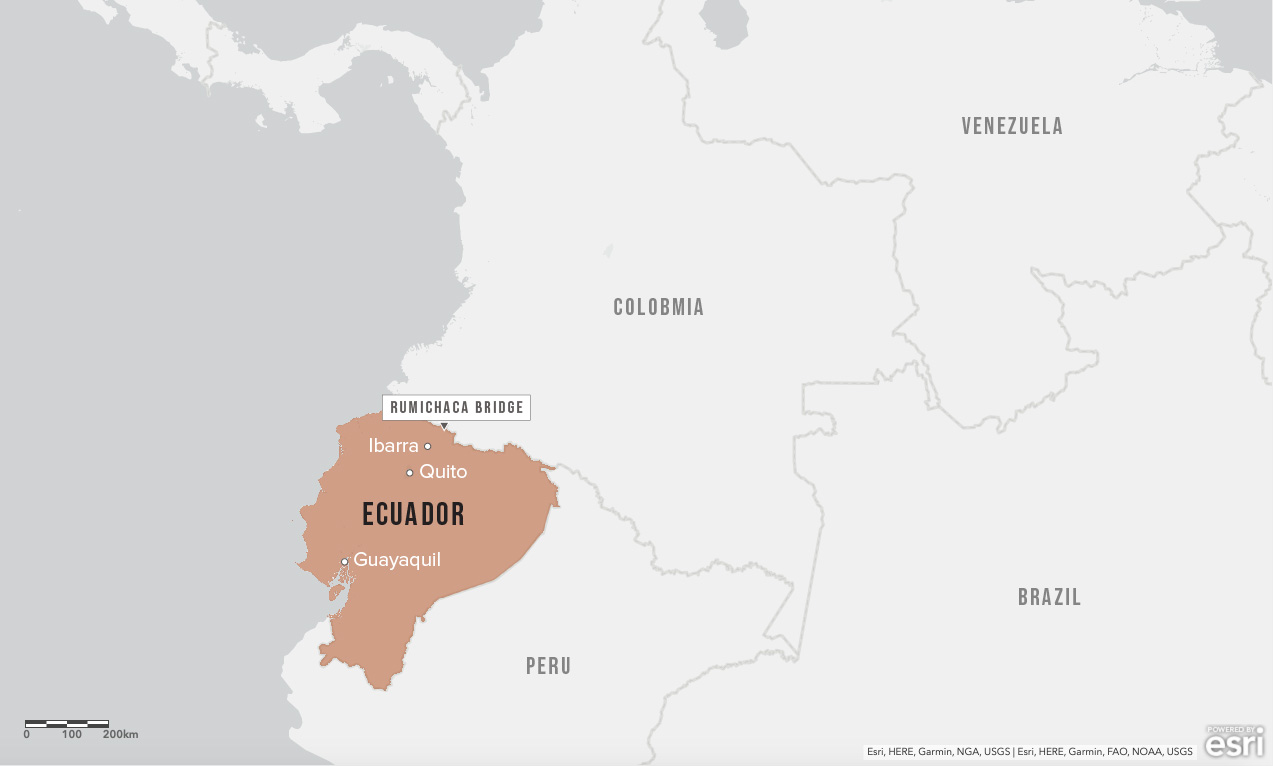A Fragile Welcome: Ecuador’s Response to the Influx of Venezuelan Refugees and Migrants

The outpouring of Venezuelans driven by the country’s internal crisis has created the second-largest displacement crisis in the world—an estimated 3.7 million Venezuelan refugees and migrants worldwide. About 3 million have left the country since 2015, and recent estimates predict that the number of Venezuelans abroad will reach 5 million by the end of 2019. Indeed, this exodus is “unprecedented […] in magnitude and speed” in this region.

Almost 1.2 million Venezuelans have entered Ecuador since 2015, most of whom have traveled onward to Peru or other third countries. However, there are now some 221,000 Venezuelan refugees and migrants remaining in Ecuador, and increasing numbers are choosing to stay. The arrival of so many in a short period of time has strained Ecuador’s institutional capacity. Many Venezuelans lack access to social services, including health, education, housing, and livelihoods. Some have also been victims of sexual and gender-based violence (SGBV), discrimination, and xenophobia. As more Venezuelans with increasingly acute needs arrive and choose to stay, Ecuador is struggling to respond.
Ecuador’s response has been inconsistent, reflecting the complex political tensions and institutional challenges it faces. On the one hand, Ecuador has historically been a refugee-hosting country and technically has maintained paths to regularization for Venezuelans. Indeed, the country has some of the most progressive human rights, migration, and asylum laws in the region. These laws include its 2017 Human Mobility Law, which enshrines a strongly principled approach to regularizing the status of refugees, asylum seekers, and migrants. The law also commits Ecuador to the principle of non-refoulement, non-discrimination, and integration.
However, some policies have undermined the intent of the law, preventing Venezuelans from accessing their rights in practice. These policy changes appear politically motivated, coming in response to surges in arrivals, shifts in public opinion, or a spike in xenophobia. As a result, the UN recently warned that, despite the country’s legal framework, access to regular status is now one of the primary challenges facing Venezuelans in Ecuador.
The consequences for Venezuelans have been devastating. For example, new entry requirements imposed in late 2018 and early 2019 effectively closed the border to many Venezuelans, sometimes separating families. This policy drove many to take irregular routes into the country, sometimes via smugglers and traffickers, thus exposing them to greater risks and denying them the protections that regular status affords. These measures also prevent many Venezuelans from accessing the labor market—a particularly harmful outcome, given that Venezuelans fleeing today have more acute needs than earlier arrivals. Some groups—including women and children, and lesbian, gay, bisexual, transgender, and queer (LGBTQ) individuals—are particularly vulnerable.
Ecuador’s policy reversals also have undermined its credibility as a regional leader. Even as it abdicates its role as host of the Quito Process—a regional forum to address the humanitarian response to Venezuelan displacement—it must remain fully engaged and fulfill its Quito commitments. Ecuador must maintain open borders in policy and practice, guarantee protections to those seeking refuge, and continue to foster migrants’ access to social services and livelihoods opportunities.
The situation for Venezuelans in Ecuador has reached a critical juncture. As the government faces growing strains on its institutional capacity, it must choose to stand by its constitution, which protects the rights of migrants and refugees. For its part, the international community must increase funding and operations to enable Ecuador to fulfill these obligations. Indeed, the Ecuador component of the UN funding appeal for the regional Venezuela crisis is only 17 percent funded. As the crisis continues, the need will grow for additional support to provide both humanitarian assistance and longer-term integration and development aid. Ecuador’s fragile welcome must be made stronger.
Recommendations
To the Ecuadorian Government:
- Maintain open borders for Venezuelans and remove financial and bureaucratic barriers to regular entry. This includes increasing capacity for immigration processing and reducing fees for obtaining or overstaying visas. It also means upholding Ecuador’s commitment to non-refoulement, non-discrimination, integration, and non-criminalization of irregular migration.
- Expedite refugee status determinationsto ensure that Venezuelans with a credible claim to asylum under the UN Convention Relating to the Status of Refugees (the 1951 Convention) can secure the international protections they are due and those eligible for international protection under the Cartagena Declaration on Refugees (the Cartagena Declaration) can access it.
- Integrate displaced Venezuelans into Ecuador’s economyby creating opportunities for livelihoods and access to the labor market. Work visas should be made more affordable and mechanisms to transfer professional certificates made accessible to displaced Venezuelans.
- Continue to supportthe tenets of the Quito Process, including harmonized entry requirements, shared standards for residence and work permits, a coordinated system to combat trafficking and smuggling, and family reunification across borders.
- Invest in anti-xenophobia campaignsto combat discrimination and anti-migrant rhetoric—an urgent priority, especially in light of the massive public backlash triggered by an isolated act of violence that occurred in the town of Ibarra in early 2019.
To the International Donor Community:
- Fund the UN’s request for $738 million for the Venezuela response—including $117 million for Ecuador—as presented in the regional Refugee and Migrant Response Plan (RMRP) for 2019.
- Support services and invest in host communities for displaced Venezuelans. This includes bolstering health, education, and other social services, which increasingly are strained in Ecuador. It also includes expanding livelihoods programs and other longer-term interventions as Ecuador shifts from a transit country to a final destination for an increasing number of Venezuelans.
- Increase support for vulnerable groups of Venezuelans. Promote programs to combat trafficking and exploitation of women and minimize the risk of SGBV; provide targeted services for LGBTQ individuals; and provide busing and shelters for caminantes (“walkers”) undertaking their journeys on foot.
To the United Nations:
- Increase support for the Quito Process. This support could include technical assistance channeled through the joint UNHCR-IOM (the United Nations Refugee Agency-International Organization for Migration) Regional Platform to encourage Quito participants to meet their respective commitments to developing a more harmonized regional approach to the crisis.
- Increase programs and resources for expanding livelihoods opportunities as increasing numbers of Venezuelans choose to remain in Ecuador. This includes deepening engagement with development actors and the private sector to help finance sustainable solutions for those staying in Ecuador.
- Provide financial and technical support to the Ministry of the Interior and Ministry of Foreign Affairs and Human Mobility to improve migration and asylum processing, including by positioning more staff at official border crossings and adopting new technology.
Background
Origins and Evolution of Venezuelan Displacement
As of March 2019, Venezuela ranks as the second-largest displacement crisis in the world, with an estimated 3.7 million Venezuelan refugees and migrants worldwide. About 3 million have left the country since 2015, and the outflow continues at a rate of 5,000 per day. Recent estimates predict that the number of Venezuelans abroad will reach 5 million by the end of 2019—a scale comparable to the Syrian refugee crisis. Indeed, this exodus is “unprecedented […] in magnitude and speed” in this region.
The devastating impacts of policies President Nicolás Maduro’s authoritarian regime has imposed since 2013 are driving Venezuelans to flee. Once the wealthiest country in Latin America, Venezuela has suffered complete economic and institutional collapse. Hyperinflation of 1 million percent has effectively rendered the currency worthless—and is predicted to reach 10 million percent in 2019. A dramatic decline of social services and the failure of state institutions have generated severe shortages of basic goods, including food, medicine, and vaccines, while political repression, rampant corruption, and widespread violence have created fear and desperation.
Even as Venezuelans flee, millions more continue to suffer within Venezuela. The average Venezuelan has lost 11 kilograms (24 pounds), and around 90 percent of the population lives in poverty. Since March 2019, nationwide power outages have further limited social services and exacerbated the humanitarian situation in the country.
Meanwhile, the political situation inside the country is becoming increasingly tense. In early 2019, Venezuela’s opposition rejected President Maduro’s claim to a second term, citing electoral irregularities. Juan Guaidó, the head of the opposition-led National Assembly, claimed constitutional authority to assume the role of interim president. He has been recognized as such by the Organization of American States (OAS), most governments in the region, and the United States. Guaidó’s supporters have repeatedly clashed with counter-protesters during street protests.
As international attention fixates on this turmoil, the millions of Venezuelans who have managed to escape to other countries are increasingly desperate. Their numbers and their needs only grow, making it clear that this dire situation is likely to become another protracted crisis.
This report provides an overview of Venezuelan displacement in the region—and to Ecuador in particular―and offers an analysis of Ecuador’s response. Although Ecuador has shown leadership and openness to Venezuelan migrants in some ways, it has also struggled to keep up with new arrivals, adapt services and assist host communities, offer protection against sexual and gender-based violence (SGBV) and exploitation, and curtail xenophobic acts among some parts of the population. The report also discusses the international response and provides recommendations to all stakeholders.